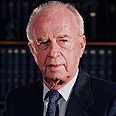
Yitzhak Rabin
צילום: יעקב סער, לע"מ
Don’t forget Yitzhak Rabin
Op-ed: Late PM reminds us that it’s better to be honest and naïve than a cynical crook
The real answer to the question of whether there is a point in holding the annual Yitzhak Rabin memorial rally in Tel Aviv must start with a different question: What do we actually remember about him, and what should we remember?
Personally, I never bought into Rabin’s portrayal as a saint. In my view he was and remains a politician who late in life realized what any average leftist activist grasped at 16. To put it simply: The occupation must end, and our situation would be better if we make peace.
Around here, the moment a politician understands it, he becomes a leader. If he also signs an agreement, he turns into a statesman.
Ariel Sharon underwent a similar process. Yet while Rabin sought a partner, Sharon realized his new understanding with his typical brutality: A one-sided, rash withdrawal from Gush Katif, without a direct agreement and without indirect diplomatic benefits.
Rabin’s tragedy was that the Oslo Accords were signed by one honest man and one crook. Rabin was the honest man; he was even naïve to some extent. Yasser Arafat was the crook who did not intend even for a moment to adhere to the deals and viewed them merely as a means to buy a little more time in order to prepare the troops for ongoing armed struggle.
When the agreement collapsed and the terror attacks persisted, hope evaporated and Oslo turned into a synonym for a diplomatic deal whose damage is greater than its benefit.
Everyone allowed to change
Rabin believed to the last moment – that is, to that cool November evening in the square that up until then was known as the Kings of Israel Square – that peace was right around the corner. Sixteen years have passed since. The world has changed. Peace is still far off, yet closer than ever.
So what do we remember from Yitzhak Rabin? We remember that every person is allowed to change until the last moment, even when he is almost at the end of the road - because if you can still change, apparently you did not yet get to the end of the road.
We remember that it’s better to be honest and even naïve and believe in good, even if it appears impossible, rather than to be a cynical crook. We remember that at times, precisely when you do the right thing, you find yourself alone. We also remember the well-known dictum: No good deed goes unpunished.
And we remember that we must remember.
- Follow Ynetnews on Facebook










